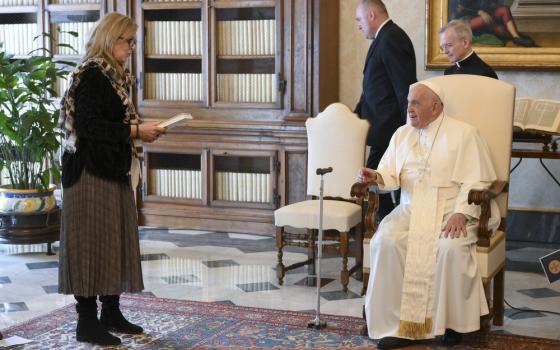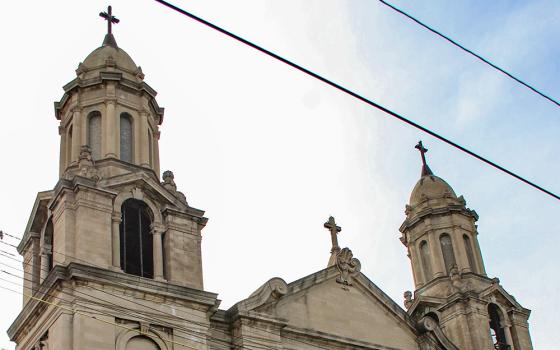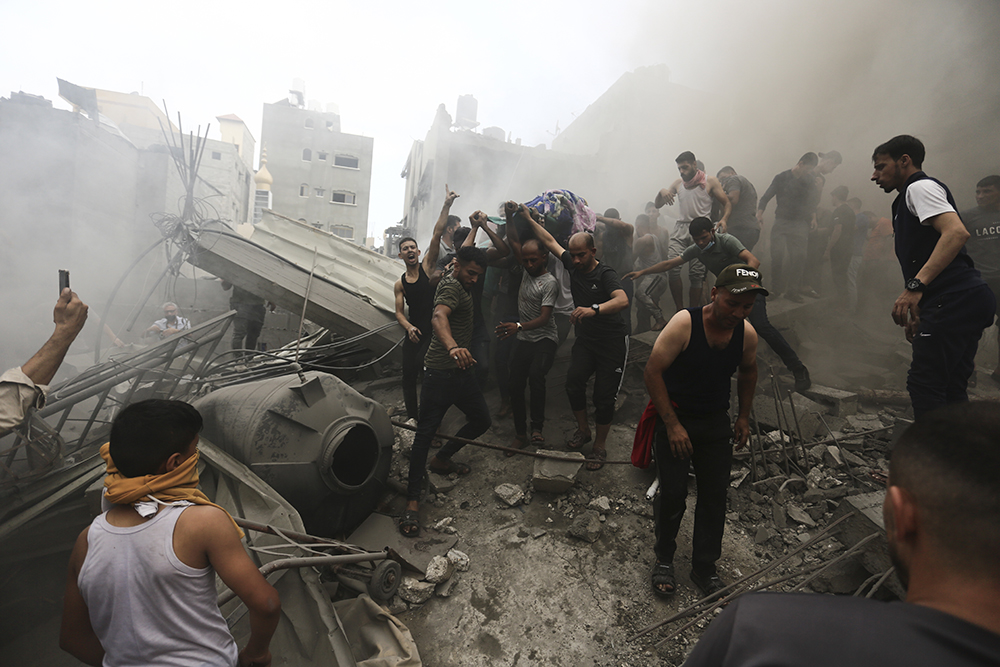
Palestinians remove a dead body from the rubble of a building after an Israeli airstrike Jebaliya refugee camp, Gaza Strip, Oct. 9. (AP/Ramez Mahmoud )
Israel's military ordered a complete siege on the Gaza Strip on Oct. 9, halting deliveries of food, water, fuel and supplies to its 2.3 million people as it pounded the Hamas-ruled territory with waves of airstrikes in retaliation for the militants' bloody weekend incursion.
Around 1,400 Israelis and Palestinians are dead two days after Hamas launched an attack that caught Israel's vaunted military and intelligence apparatus completely off guard and led to fierce battles in its streets for the first time in decades.
The Israeli military said it had largely gained control in its southern towns where it had been battling Hamas gunmen. But Hamas and other militants in Gaza say they are holding more than 130 soldiers and civilians snatched from inside Israel.
Israeli tanks and drones were deployed to guard breaches in the Gaza border fence to prevent new incursions. Thousands of Israelis were evacuated from more than a dozen towns near Gaza, and the military summoned 300,000 reservists — a massive mobilization in a short time.
The moves, along with Israel's formal declaration of war on Oct. 8, pointed to Israel increasingly shifting to the offensive against Hamas, threatening greater destruction in the densely populated, impoverished Gaza Strip.
Already, civilians on both sides have suffered a terrible toll: around 900 people, including 73 soldiers, have been killed in Israel, and 493 people have been killed in Gaza, according to media and authorities on each side. Israel says hundreds of Hamas fighters have been killed. Thousands have been wounded on both sides.
In response to Israel's bombardment, the spokesman of Hamas' armed wing, Abu Obeida, said in an audio released Oct. 9 that the group will kill one Israeli civilian captive any time Israel targets civilians in their homes in Gaza "without prior warning." Israeli Foreign Minister Eli Cohen warned Hamas against harming any of the hostages, saying, "This war crime will not be forgiven."
A major question remains whether Israel will launch a ground assault into the tiny Mediterranean coastal territory, a move that in the past has brought even greater casualties.
Israel and Hamas have had repeated conflicts in past years, often sparked by tensions around a Jerusalem holy site. This time, the context has become potentially more explosive, and both sides talk of shattering with violence a years-long Israeli-Palestinian deadlock left by the moribund peace process.
Israel has been stunned by a surprise attack and death toll unseen since the 1973 war with Egypt and Syria. That is fomenting calls to crush Hamas no matter the cost, rather than continuing to try to bottle it up in Gaza. Israel is run by its most hard-right government ever, dominated by ministers who adamantly reject any Palestinians statehood.
Hamas, in turn, says it is ready for a long battle to end an Israeli occupation it says is no longer tolerable. Desperation has grown among Palestinians, many of whom see nothing to lose under unending Israeli control and increasing settler depredations in the West Bank, the blockade in Gaza and what they see as the world's apathy.
"I ask you to stand firm because we are going to change the Middle East," Israeli Prime Minister Benjamin Netanyahu told authorities from the south Oct. 9. "I know you have been through terrible and difficult things. What Hamas will go through will be difficult and terrible … we have only just begun."
Advertisement
In the early evening, the sound of explosions echoed over Jerusalem when a volley of rockets fired from Gaza hit two neighborhoods — a sign of Hamas's reach. Israeli media said seven were wounded.
On Oct. 9, Israeli warplanes carried out an intense bombardment of Rimal, a residential and commercial district of central Gaza City, after issuing warnings for residents to evacuate. Amid continuous explosions, the building housing the headquarters of the Palestinian Telecommunications Company was destroyed.
Israeli Defense Minister Yoav Gallant ordered a "complete siege" on Gaza, saying authorities would cut electricity and block the entry of food and fuel.
Gallant said Israel was at war with "human animals," using the kind of dehumanizing language often employed by both sides at times of soaring tensions.
Israel and Egypt have imposed a blockade on Gaza of varying strictness since Hamas seized power in 2007. In recent years Israel has provided limited electricity and allowed the import of food, fuel and some consumer goods, while heavily restricting travel in and out.
Jan Egeland, secretary general of the Norwegian Refugee Council aid group, warned that Israel's siege would spell "utter disaster" for Gazans.
"There is no doubt that collective punishment is in violation of international law," he told The Associated Press. "If and when it would lead to wounded children dying in hospitals because lack of energy, electricity, and supplies, it could amount to war crimes."
The Israeli seal will leave Gaza almost entirely dependent on its crossing into neighboring Egypt at Rafah, where cargo capacities are lower than other crossings into Israel.
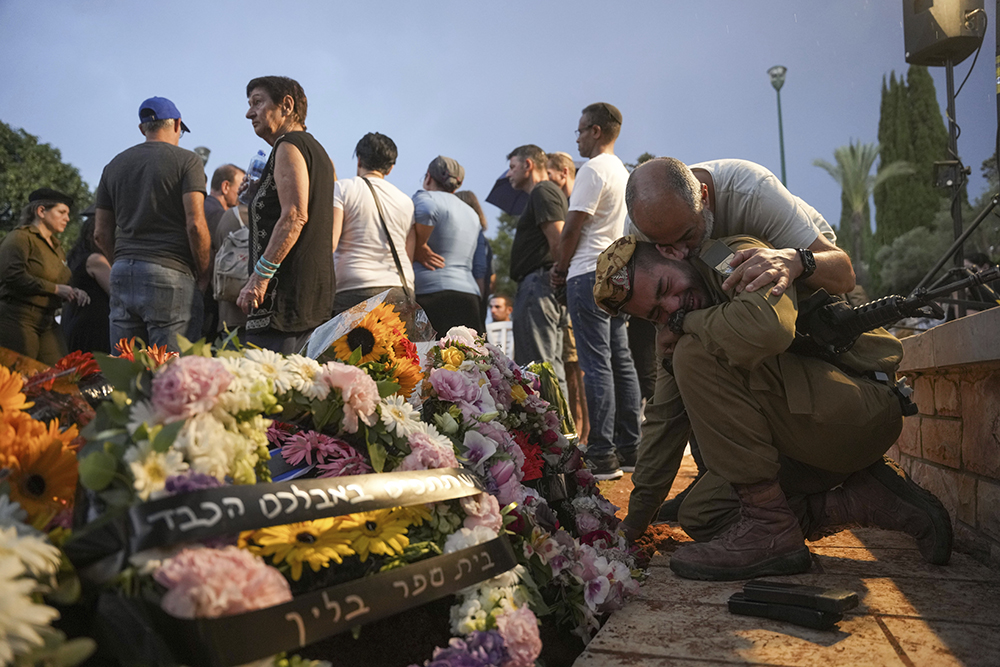
Friends and relatives of Ilai Bar Sade mourn next to his grave during his funeral at the military cemetery in Tel Aviv, Israel, Oct. 9. Bar Sade was killed after Hamas militants stormed from the blockaded Gaza Strip into nearby Israeli towns. Israel's vaunted military and intelligence apparatus was caught completely off guard, bringing heavy battles to its streets for the first time in decades. (AP/Erik Marmor)
An Egyptian military official, speaking on condition of anonymity because he was not authorized to talk to the press, said more than 2 tons of medical supplies from the Egyptian Red Crescent were sent to Gaza and efforts were underway to organize food, and other deliveries, but the question of allowing in fuel was not yet decided.
Egypt expressed fears of a possible exodus of Gazans onto its soil. The state-owned Al-Qahera news channel, which is close to security agencies, quoted an anonymous high-level official warning against "pushing Palestinians toward the Egyptian border."
Israeli Rear Adm. Daniel Hagari told reporters that Israeli bombardment was moving from district to district to destroy houses and buildings Israel says are being used by Hamas. Israel is planning to hit thousands of targets, he said. He said "hundreds" of Hamas militants were buried under rubble of buildings destroyed by Israel in the past 48 hours. His claims of the numbers — and his characterization of the dead as Hamas — could not be confirmed.
In the southern Gaza city of Rafah, an Israeli airstrike early Oct. 9 killed 19 people, including women and children, said Talat Barhoum, a doctor at the local Al-Najjar Hospital. Barhoum said aircraft hit the home of the Abu Hilal family, and that one of those killed was Rafaat Abu Hilal, a leader of a local armed group.
The U.N. said more than 123,000 people have fled their homes in Gaza — many after Israeli warnings of imminent bombardment. The U.N. agency for Palestinian refugees, UNRWA, said a school sheltering more than 225 people took a direct hit. It did not say where the fire came from.
Meanwhile, after about 48 hours of pitched battles, Hagari said the military has "control" of its border communities in southern Israel. He said 15 of 24 border communities have been evacuated, with the rest expected to be emptied in the coming day.
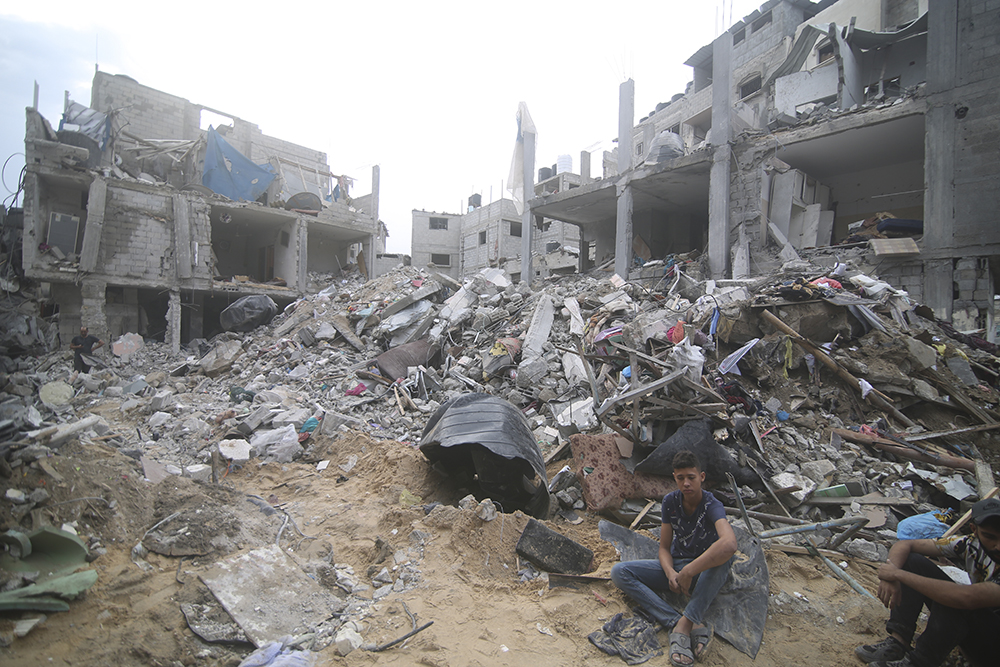
Palestinians sit by the rubble of the Abu Hilal family home in Rafah refugee camp, Gaza Strip, Oct. 9. The strike killed dozens of people. (AP/Hatem Ali)
Earlier, Hamas spokesman Abdel-Latif al-Qanoua told the AP over the phone that the group's fighters continued to battle outside Gaza and had captured more Israelis as recently as Monday morning.
He said the group aims to free all Palestinian prisoners held by Israel, which in the past has agreed to lopsided exchange deals in which it released large numbers of prisoners for individual captives or even the remains of soldiers.
Among the captives are soldiers and civilians, including women, children and older adults, mostly Israelis but also some people of other nationalities. The armed wing of Hamas claimed on its Telegram channel that four of them were killed in Israeli airstrikes. That could not be independently confirmed.
Egypt's state-run Al-Ahram newspaper said Oct. 9 that Egyptian officials are trying to mediate a release of Palestinian women in Israel's prisons in exchange for Israeli women captured by militants.
Hamas has ruled Gaza since driving out forces loyal to the internationally recognized Palestinian Authority in 2007 and its rule has gone unchallenged through the blockade and four previous wars with Israel.
After breaking through Israeli barriers with explosives at daybreak Saturday, an estimated 1,000 Hamas gunmen rampaged for hours, gunning down civilians and snatching people in towns, along highways and at a techno music festival attended by thousands in the desert. Palestinian militants have also launched around 4,400 rockets at Israel, according to the military.
On Sunday, the U.S. dispatched an aircraft carrier strike group to the Eastern Mediterranean to be ready to assist Israel, and said it would send additional military aid.
Editor's note: Adwan reported from Rafah, Gaza Strip. AP writers Isabel DeBre and Julia Frankel in Jerusalem; Wafaa Shurafa in Gaza City; Tia Goldenberg in Tel Aviv, Israel; Bassem Mroue and Kareem Chehayeb in Beirut; Samy Magdy in Cairo; and Amir Vahdat in Tehran, Iran, contributed to this report.


